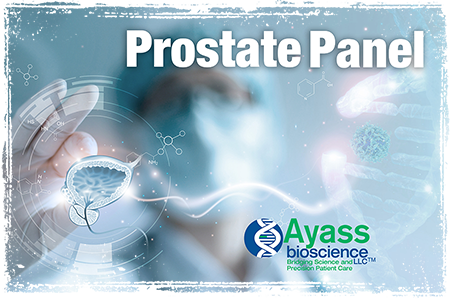A Test You Can Trust
Results in Less Than 48 Hours!

Comprehensive analysis of 17 genes (DNA Sequencing) and 37 genes (RNA Sequencing) linked to prostate cancers
Our Prostate Sequencing Panel focuses on identifying somatic gene mutations leading to prostate cancers
Our targeted next generation sequencing (NGS)-based assays of genomic tumor tissue (FFPE tissue) identifies unique somatic mutations that accrue in cancer cells. Our panel targets 21 genes via DNA sequencing and 49 Driver Genes via RNA sequencing with known associations with prostate cancer. Results in less than 48 hours!
Why is it important to identify somatic mutations
Prostate cancer often shows no symptoms in the early stages and it is the 3rd most common cancer in the United States (more than 190,000 new cases diagnosed each year). The majority of prostate cancers are adenocarcinomas. It is one of the most treatable cancers (five-year survival rate of nearly 98%). Risk factors: age (55 or older men), family history (father, brother, son), race (African American men or men of African descent have nearly double the risk of prostate cancer), diet (a high-fat diet, particularly a diet high in animal fats), nationality (prevalent in North America and northwestern Europe), a largely inactive lifestyle, obesity, excessive alcohol use, or exposure to certain toxic chemicals.
By knowing which mutations a patient has, it is possible to determine the best treatment options for each patient (surgery, type of radiotherapy, hormone replacement, and other techniques indicated individually).
Identifying somatic mutations helps determine targeted therapies which could be right for each patient and avoid ones that lack clinical benefit, resulting in an overall better patient outcome.
Our clear and concise reports support clinicians and pathologists in the making of informed treatment decisions. The reports summarize relevant biomarker findings and link them with information from public sources.
We strongly recommend that you seek genetic counseling to understand the limitations and possible consequences of this test.
All tests are performed in Ayass BioScience, LLC. Ayass BioScience, LLC (DBA Ayass Laboratory, LLC) is a CLIA certified laboratory. If you have any questions about COVID-19 Testing, Genetic Testing, Clinical Testing, Pharmacogenetic Testing or Research at Ayass BioScience, LLC, please call today at 972-668-6005 or fill out our contact form on the bottom of this page. We will answer any question you might have.

